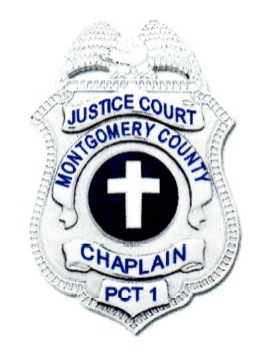
The Freedom From Religion Foundation is deeply dismayed over what it calls a “Christian nationalist” interpretation of the First Amendment’s Establishment Clause by an appeals court decision approving courtroom prayer.
A three-judge panel of the 5th U.S. Circuit Court of Appeals ruled yesterday that a local justice of the peace’s practice in Texas of locking doors and opening with a prayer ceremony is “noncoercive.”
FFRF had won its challenge against Montgomery County Judge Wayne Mack’s courtroom prayer practice last year in district court. Plaintiffs FFRF and local attorney “John Roe” had sued Mack over his divisive practice of opening each court session with chaplain-led prayer.
U.S. District Judge Kenneth M. Hoyt ruled in May 2021: “The court is of the view that the defendant violates the Establishment Clause when, before a captured audience of litigants and their counsel, he presents himself as theopneustically inspired, enabling him to advance, through the chaplaincy program, God’s ‘larger purpose.’ Such a magnanimous goal flies in the face of historical tradition, and makes a mockery of both religion and law.”
Overturning that decision are U.S. 5th Circuit Judges Jerry Edwin Smith and Kurt D. Engelhardt. Judge E. Grady Jolly, who concurred in part, authored a strong dissent. Despite no evidence of any other U.S. judge currently opening with prayer or that courtroom prayer is a tradition, the ruling claims to be based on historic practice, including because some courts open with “God save this honorable court” or similar utterances. The ruling also inaptly compares the practice to legislative prayer. Jolly witheringly critiqued these conclusions from the majority and wrote that the plaintiffs had produced considerable evidence that Judge Mack’s prayers are coercive to those who attend court sessions. Jolly asserts, “For the majority to find that there is no evidence of coercion, suggests, in my opinion, willful blindness and indisputable error.”
The decision reflects the U.S. Supreme Court majority’s rejection of the Lemon Test to decide Establishment Clause disputes, which measured constitutionality based on whether the action had a secular purpose, advanced or inhibited religion or fostered excessive entanglement with religion. Instead the high court’s extremist supermajority advanced a “history and tradition test” in its recent Kennedy v. Bremerton School District ruling, as well as saying an action must be “coercive” to be unconstitutional.
FFRF Co-President Annie Laurie Gaylor blasted the decision, saying, “A courtroom is not a church, and a judge’s bench should not be a pulpit. This is a dishonest decision, both in claiming a tradition of courtroom prayer and in denying that it is coercive.” She added that manipulation of the facts to privilege religion and ignore constitutional dictates barring establishments of religion by government actors is a hallmark of Christian nationalist-influenced court decisions.
Mack’s prayer practice involves the bailiff reading a script announcing an invocation by a volunteer chaplain and a disclaimer saying individuals are not required to be present. Everyone is told to rise and stand. Mack enters the room, introduces and thanks the chaplain, mentioning the church he represents, then the chaplain, invariably Christian, prays. If there is only one bailiff present (typically the case), the doors are magnetically locked as the bailiff speaks and cannot be opened from the outside. Visitors can only leave by pressing a small button that is difficult to spot and makes them conspicuous.
Roe is a local attorney who felt compelled to be present during the prayers because of his duty to his client not to alienate the judge, and stopped taking cases in Montgomery County altogether to avoid Mack.
Mack ran for justice of the peace on a platform promising to create a chaplaincy program and open court with prayer. The decision notes that Mack invites the chaplains to open court with prayer in order to “honor and thank” them.
FFRF and Roe filed the current case against Mack in 2019. Mack was defended by First Liberty, an extremist Christian right legal group that represented Coach Kennedy and previously won the Bladensburg cross case permitting a huge Latin cross to stay on public property in Maryland. As a justice of the peace, Mack has jurisdiction over minor misdemeanor offenses and civil matters, including juvenile cases. Montgomery County is north of Houston, and its county seat is Conroe.
“This is a clear case of religion-based coercion,” comments FFRF Legal Director Rebecca Markert.
FFRF and Roe are represented by FFRF Associate Counsel Sam Grover, with Attorney Ayesha Khan of Washington, D.C., serving as co-counsel.
The Freedom From Religion Foundation has 38,000 members and several chapters all over the United States, including 1,485 members and a chapter in Texas.

